by Mary Howard
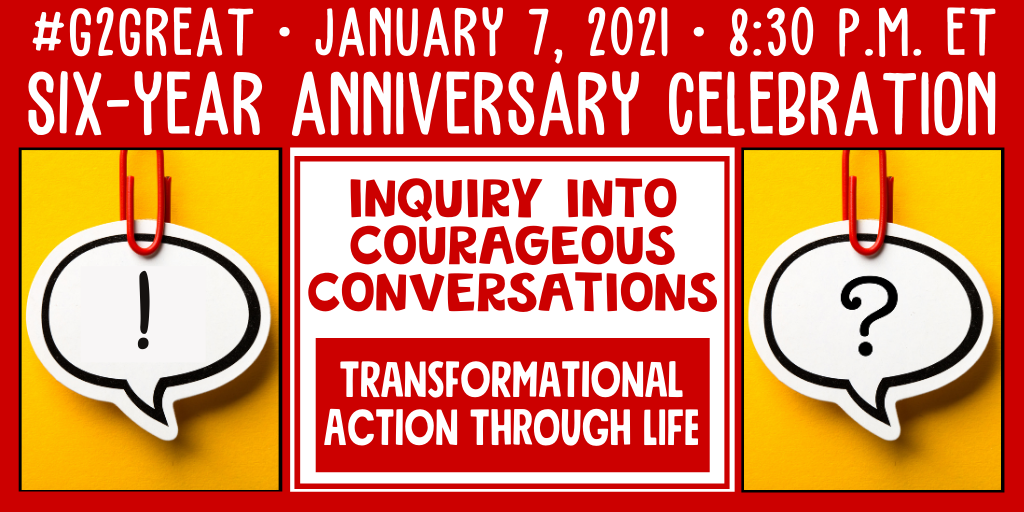
I sit at my computer. With fingers perched joyfully on the keyboard I type. Six-Year Anniversary Chat. I pause to soak in the magnitude of those words. I swell with pride.
Each year on our #G2great anniversary, I linger in the glow of dialogue past as I eagerly anticipate those that are yet to come. These celebrations still feel so unexpected since our 1/8/15 birth was intended as a ten-week study of my book, Good to Great Teaching: Focusing on the Literacy Work that Matters (Heinemann 2012). On our 5th anniversary, I wrote a post about the book that launched #G2great: 10 Lessons Teachers Taught Me About Good to Great Teaching. It seems fitting to share my post for the second time as we celebrate a new year of the chat that carries its name.
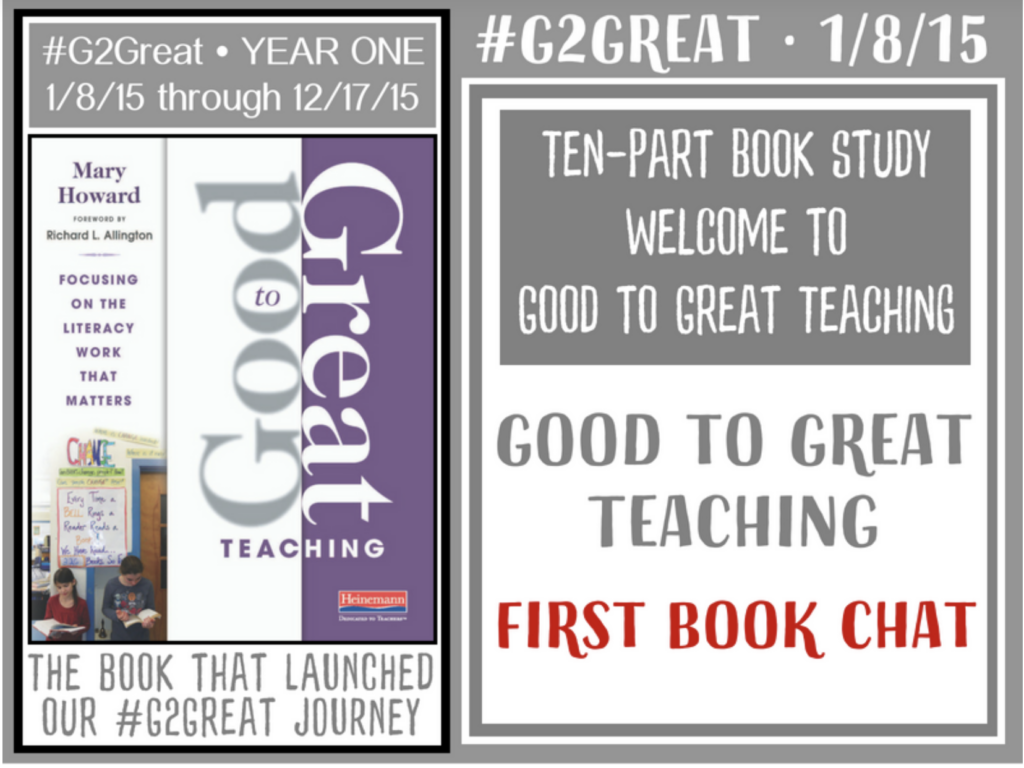
Standing joyfully before the year six gate, I’d like to express my deep gratitude for what has been a collective labor of love among dear friends; co-moderators Jenn Hayhurst, Fran McVeigh, Valinda Kimmel, Brent Gilson and chat advisor, Towanda Harris. It’s a blessing to continue the #G2great chat experience alongside friends committed to our shared learning. I’d also like to express appreciation for every educator who has ever shown up on Thursday at 8:30 p.m. across the year. Your unrelenting dedication for your own learning in the name of children is the perpetual conversational fuel that keeps #G2great thriving into year six.
As I glance back at the last five years and look ahead to year six, I think about 286 #G2Great chats that have allowed us to take a closer look at authors, students, topics, series, articles, blog posts and podcasts along with 243 blog reflections extending each one. Past chats lovingly reside in our Wakelet home where future collaborations will join them in the coming days. Our celebration for each of our anniversaries is captured in the blog posts and Wakelet artifacts below:
Anniversary Literacy Lenses Blog Reflections
Year 1: 1/5/16 (Blog Post launch)
Year 2: 1/5/17 The Gifts of YOU
Year 3: 1/4/18 (Curiosity Crew collaboration)
Year 4: 1/10/19 (Curiosity Crew collaboration)
Year 5: 1/9/20 WHAT IF?
Year 6 1/7/21 Courageous Conversations
Anniversary Chat Artifacts on Wakelet
While our #G2great 2015 maiden chat voyage was based on one book, we have since broadened our vision. Our respect for collegial discourse inspires us to maintain this collaborative space where educators come to share their understandings, curiosities and wonderings in service of professional introspection and inquiry. These collective think partnerships challenge us to put our beliefs on display in a twitter style reflective mirror where we can look beyond ourselves. Our goal has always been to offer a range of topics and texts, but we will continue to expand our selections to those that push us to engage in dialogue that further nudges us out of our respective comfort zones. For this reason, we thought that courageous conversations was a fitting launching for Year Six.
Before I turn my attention to #G2great tweets, I’d like to emphasize what courageous conversations are not. The day before our anniversary chat, the antithesis of courageous conversations reared its ugly head as our democratic process erupted into a mob mentality fueled by social media, conspiracy theory lies and failed leadership. We watched as cowardly confrontations riddled with venomous intent unfolded into real life horror across our TV screens. Compounding the sadness and fear this evoked was the realization that it would have been a very different scene if this mob had not been mostly white. At a time when police brutality and racism run rampant, we cannot ignore this stark distinction of realities.
Courageous conversations invite us to recognize social injustices and inequities and to speak out against them. Courageous conversations invite us to listen before speaking. Courageous conversations invite us to stand up and be heard when it matters most. Courageous conversations invite us to step out of our comfort zone even when we fear how our words might be perceived or even acted upon. Courageous conversations are not motivated by hate but by carefully weighing our words. Courageous conversations ask us to look beyond our own reality and see the reality of others. Courageous conversations are thoughtfully responsible and allow us to look within to consider our own biases that may well influence those conversations.
While courage (or the lack of) can happen anywhere including on social media, many have argued that it is impossible to have a “conversation” in a twitter chat. While we do not consider our chat a substitute for face-to-face, back-and-forth real time dialogue that we also hold dear, we do believe that it offers a starting point that affords an opportunity to engage with others even when that may be otherwise unlikely given our wide range of cities, states, and even countries. We also worry that many educators who attend our chat do not have a safe space where they can have these conversations. We would like to think that a twitter chat, while not the traditional kind of conversation that would be far more powerful, offers seeds as a first step along a pathway that could reach far beyond our chat.
Here are a few tweets that reflect seeds of courageous conversations
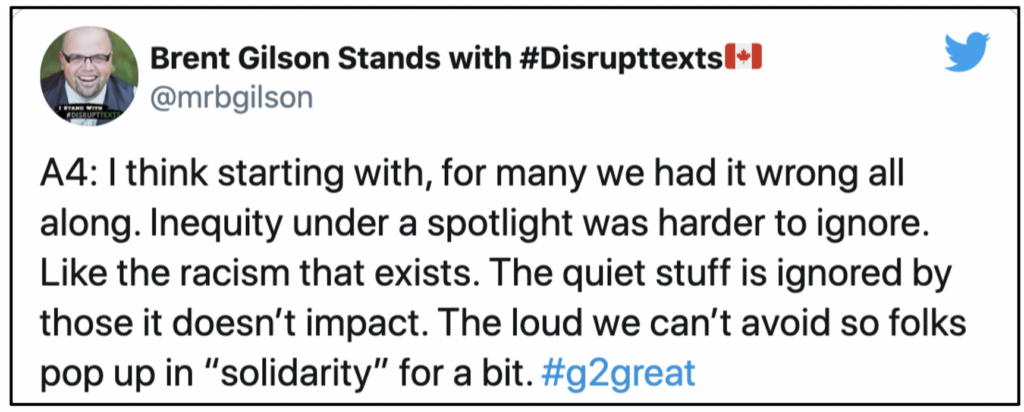


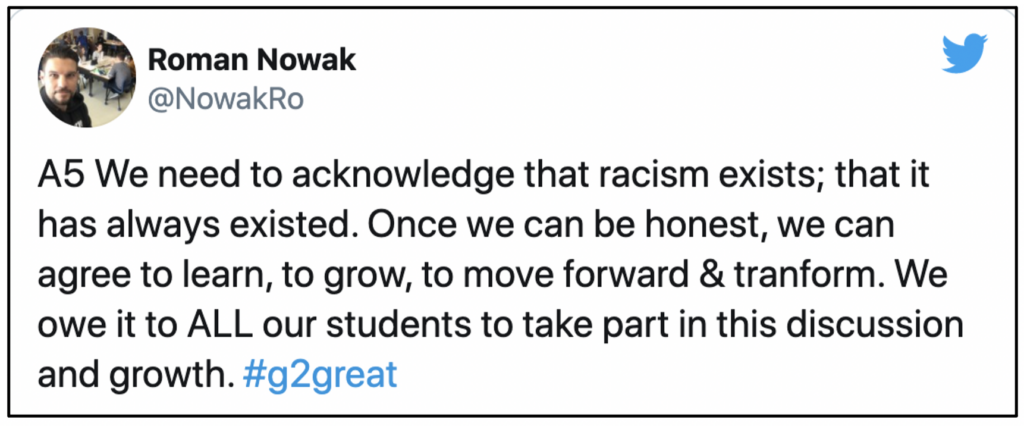

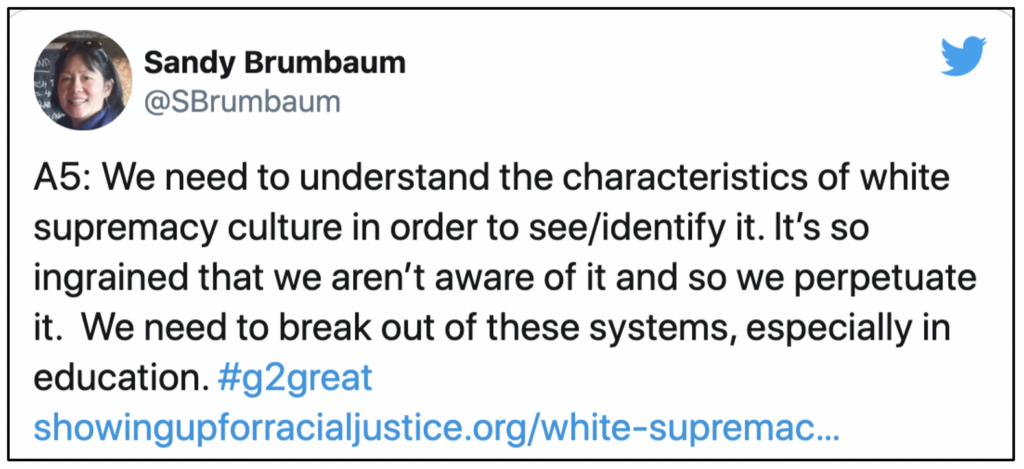
Courageous conversations can also reflect the ways in which we stand up for the instructional practices and the impact those practices may have on children for better or for worse if they are not carefully considered and equitable. These conversations implore us to speak out when we recognize that our practices marginalize any child or that those practices ignore the right of all children to receive a responsive, equitable and meaningful education that respects them as unique individuals with unique needs.
Here are a few tweets that reflect seeds of courageous conversations
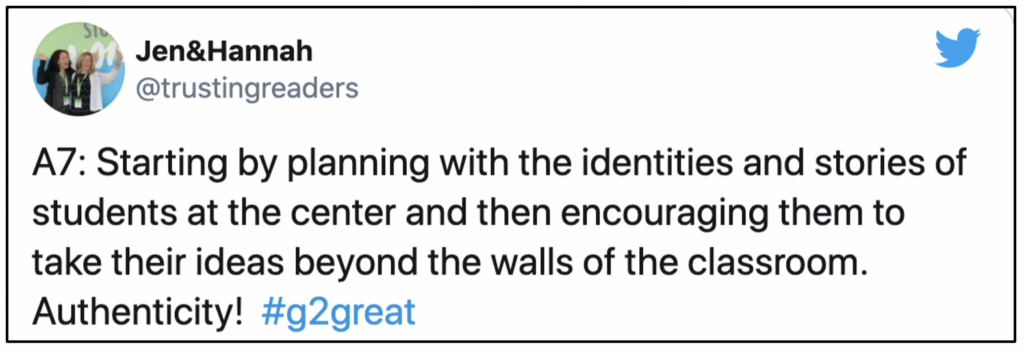


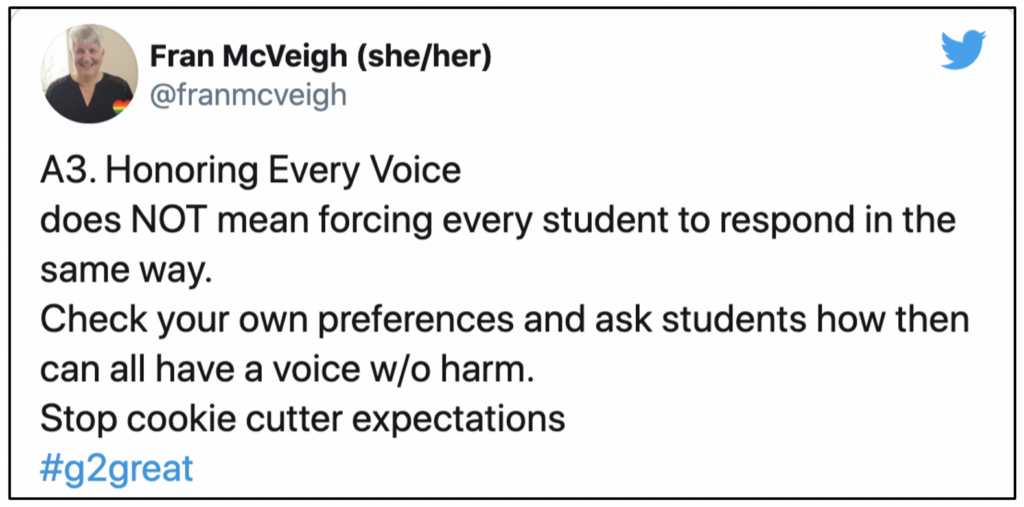
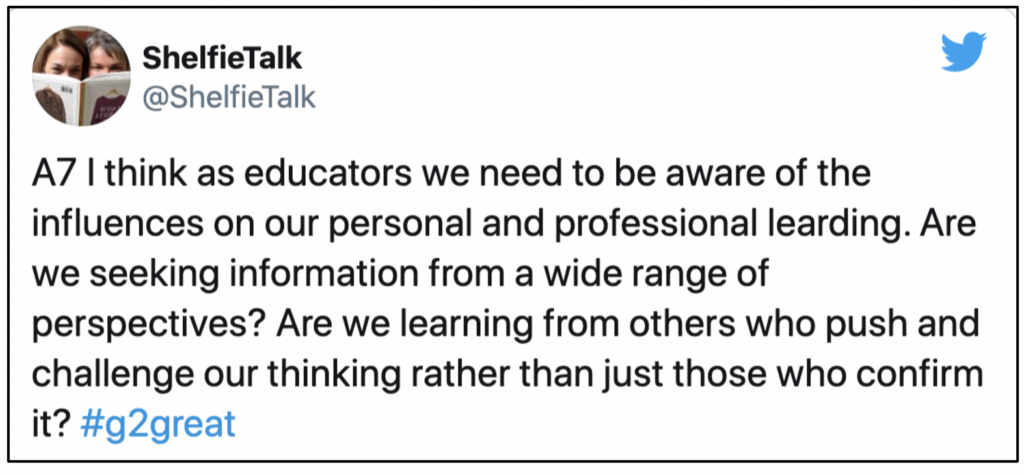


After looking back at our #G2great chat, I noticed some things to keep in mind as we encourage and support the courageous conversations we hope might begin on this chat and move into our schools and our classrooms and ultimately out into the world.
Courageous conversations traverse along a journey, not a stopping point
Courageous conversations are not something we schedule into the school calendar and then pat ourselves on the back for holding a ‘courageous conversation event.’ We must, rather, commit to courageous conversations for the long-haul as we create an invitational spirit for conversations as opportunities arise day after day, week after week and year after year. Our journey into courageous conversations is a never-ending proposition with no point of arrival. It is our responsibility to challenge ourselves so that we might begin to find a certain measure of comfort within discomfort.
Courageous conversations can only thrive in a respectful culture of mutual trust
Our schools can either be a breeding grounds for courageous conversations or quell the possibility for conversations with any semblance of courage. But before we can support people in stepping out of their comfort zones, we must first ensure that they know they can do so within a safe space. It’s hard to encourage anyone to speak up in an environment where verbal attacks will likely follow. This begins with the school leader who supports these relationships across time and models the same discomfort asked of teachers. Creating a culture of mutual trust takes substantial time, effort and ongoing collective commitment.
Courageous conversations rise from our awareness of growth opportunities
It’s hard to engage in courageous conversations unless we are aware that those courageous conversations are warranted in the first place. Since life often informs this important dialogue, we must be willing to pay attention so we might notice the real-life experiences that could inform and support conversations that beckon us into courageous action. We can only have courageous conversations with others if we are open to and notice these opportunities. This is then likely to increase the potential that we will be moved to engage in them.
Courageous conversations empower us when they have transformative potential
Our chat subtitle, transformational action through life, was intentional. We believe that the heart and soul of courageous conversations is that they are informed by life, or what happens around us directly or from a distance. These events can and should elicit conversations that can then spur us into action in transformational ways. In other words, we don’t simply engage in courageous conversations for the sake of wearing courageous conversation badges of honor. Rather, we engage in these conversations because life implores us to have them knowing that the learning that comes from shared conversation can become an invitational springboard to action.
Courageous conversations can begin with teachers but are meant to transfer to students
Courageous conversations are an important first step, but we can’t stop there. We engage in these conversations for the purpose of making our schools more equitable in honor of students. But what we do in honor students we must do in the company of students as we model courageous conversations in action. If we step out of our comfort zones with students, we show them courageous conversations in technicolor view and invite them into the conversational experience. As we become better humans, we are more likely to offer opportunities for students to do the same. If we see this as a one-way proposition, we do kids a great disservice and alleviate discourse that could transform them into action. Sara Ahmed reminds us that the world hands us a curriculum. We have the choice to turn our backs or welcome that curriculum so that life is for the greater good of all.
CLOSING THOUGHTS:
2020 is a year unlike any other we have ever experienced. This pandemic continues to burgeon out of control along with escalating inequities we have seen in and out of our schools whether teaching occurs in face-to-face or virtual settings. We have all watched educators bravely teach in new ways, often with little support, and still they rise to the occasion in ways we could never have anticipated. Couple this with tragic events of the last year and we could have a recipe in disaster. Yet once again, so many teachers have risen to the occasion. We still have a long way to go and I would hope that this pandemic and the fear and loneliness that came with it will inspire us all to take the next steps to bring those courageous conversations to life.
We can just turn our back on a year we may hope to forget or we can use this experience to inform and inspire the courageous conversations we choose to have with each other and with students. These conversations are often fueled by our life experiences, but they only have the potential to be transformational if we are open to thinking that comes from a broader perspective than our own.
Courageous Conversations in Action
Two days before our Six-Year #G2Great anniversary Kathy Collins, Matt Glover, Aeriale Johnson and Vicki Vinton joined Renee Dinnerstein to engage in a video discussion: Supporting and Nurturing Young Readers and Writers during the Pandemic and Beyond. This remarkable group of educators model what courageous conversation looks like, so it seems only fitting to end with their wisdom.
On behalf of my #G2great team, we would like to thank you for five years and counting of dialogue and the many courageous conversations that we are yet to have. Just as we want to venture into uncharted territories in our #G2great chat, we hope that each of you will venture into those territories alongside us – both within and beyond our chat.
Thank you for helping us to grow side-by-side with you twitter style!
